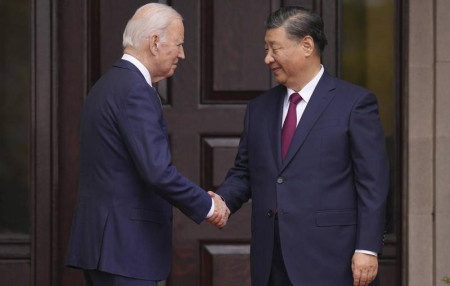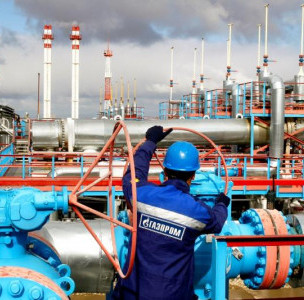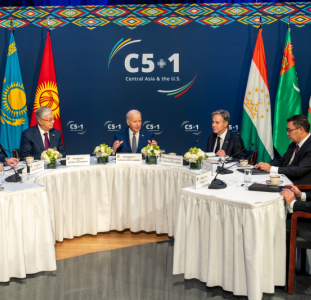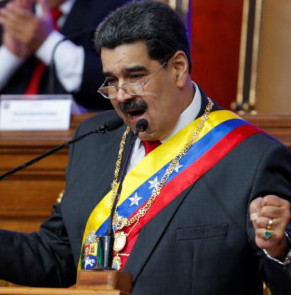
Joe Biden and Xi Jinping settle differences at their San Francisco summit; the UN Security Council passes a resolution on Gaza humanitarian pauses on its fifth try; and foreign interest in Russian military equipment is growing amid Moscow’s special military operation. These stories topped Friday’s newspaper headlines across Russia, according to TASS news agency.
Media: Biden, Xi make nice at San Francisco summit
The summit between the leaders of the US and China, which took place in a San Francisco suburb, saw no major breakthroughs, but a number of agreements were reached. Joe Biden and Xi Jinping announced the resumption of relations between the two countries’ militaries and the creation of a working group on the fight against drugs. Meanwhile, it seems that Beijing’s wishes concerning the lifting of sanctions and a change in the US export control policy regarding sensitive equipment were not taken seriously. Moreover, right after the talks, the American leader once again called the Chinese president "a dictator," Kommersant writes.
"The talks ended without fanfare, which is not surprising because Biden cannot afford to make any concessions to China ahead of the election. The US leader will probably depict the resumed ties between the militaries, which Beijing suspended last year, as a success. However, this is nothing but a move to restore the status quo," Kirill Babayev, director of the Russian Academy of Sciences’ Institute of China and Contemporary Asia, pointed out.
What the US does in the short term will make it clear whether China has achieved anything. "If economic sanctions are eased or tariffs on some Chinese goods are removed after the meeting, then there will be some kind of a thaw. But judging by the first statements from Beijing and Washington, the meeting just confirmed the mutual animosity that exists between the opponents," Babayev concluded.
When speaking about "Xi the dictator," Biden tried to avoid a trap set by a US reporter who asked a related question, Alexander Lomanov, head of the Center for Asia-Pacific Studies at the Russian Academy of Sciences’ Institute of World Economy and International Relations, told Vedomosti. Had Biden said he did not see the Chinese leader as a dictator, some in the US would have accused him of catering to Chinese communists, which would have worsened his position in the election race. However, Biden did try to shift the focus away from the Chinese president’s personality, pointing to differences in the two political systems.
The United States and China are now on a collision course and no negotiations or agreements can change this because the rivalry between the two great powers by definition dictates them to compete, Russian International Affairs Council expert Alexey Naumov said. Unresolved issues such as Taiwan, North Korea and relations with Russia will remain and this is a matter of fact, Naumov noted. The talks were most likely necessary to avoid an escalation of tensions and from this perspective, they can be considered a success. Still, there is no sign of partnership.
Vedomosti: UNSC finally passes resolution on Gaza humanitarian pauses
The United Nations Security Council has passed Resolution 2712 calling for expanded humanitarian pauses in the Gaza Strip. While the first four attempts to adopt such a document failed, the recent resolution, submitted by Malta, succeeded because three out of the five permanent council members - Russia, the US and the UK - abstained, Vedomosti notes.
Moscow welcomed the passing of "at least some humanitarian document," Russian Permanent Representative to the UN Vasily Nebenzya said. However, he described "the lack of a call for an immediate ceasefire" as the main flaw in Malta’s resolution on Gaza.
Israel is unlikely to take the resolution into account when making further decisions on the Gaza Strip, Lyudmila Samasrkaya, a researcher with the Center for Middle East Studies at the Russian Academy of Sciences’ Institute of World Economy and International Relations, pointed out. One of the reasons is because even though the UNSC resolution is legally binding, there is no way to get Israel to implement it. The expert added that the United States’ decision to abstain from voting stemmed from its unwillingness to support any document that did not unequivocally condemn Hamas. According to Samarskaya, Washington agrees with the resolution in principle. "However, it’s difficult to judge how the document will be implemented in the current circumstances," the analyst said.
The very fact that the UN Security Council has approved a resolution is a net positive as it indicates a certain consensus in the international community, Ikbal Durre, associate professor at Moscow State Linguistic University’s Department of Foreign Regional Studies, noted. The expert believes that it may encourage Israel to partially reconsider its tactics, though it will not change its key strategic goals. According to Durre, Tel Aviv will likely only consider such initiatives after it takes control of northern Gaza.
Izvestia: Foreign interest in Russian military equipment grows amid special military operation
Russia presented over 250 samples of military equipment at the Dubai Airshow 2023. This is the largest exhibition for Russia’s defense industry at a foreign venue since the start of Moscow’s special military operation, Izvestia writes.
There were concerns before the start of the Dubai Airshow 2023 that Russia’s delegation could find itself on an island at the event. However, both participants and experts pointed out following the show that interest in Russian innovations and projects had only grown.
Of particular interest were the Il-76MD-90A(E) heavy transport aircraft, the Ka-25 Alligator attack helicopter and the export versions of Russian air defense systems. Several countries had their eye on the new Ilyushin plane and talks are expected to be held on the export of 40 to 50 aircraft. The Ka-25 helicopter, which has proved effective in the military operation, drew special attention.
Russian Deputy Prime Minister Denis Manturov told Izvestia that a large number of potential foreign customers - namely Middle Eastern and African countries - were interested in purchasing the Ansat medical helicopter.
Besides, Russia showcased RBB-MD2 and RBB-BD guided air-to-air missiles and the X-69 cruise missile designed for the Su-57 fighter jet, which was demonstrated abroad for the first time. In addition, an upgraded life-support and self-defense system for pilots was also on display. The shortened Kalashnikov assault rifle AK-19, which is part of the system, made its foreign debut, as well as the 9-millimeter Kalashnikov PPK-20 submachine gun and the 9-millimeter Lebedev LPK pistol.
"Everyone is interested in us at this point and isolation is not an issue," military expert Vadim Kozyulin emphasized. "The conflict in Ukraine has turned out to be a testing ground for many weapons systems. Hundreds of types of military hardware and projects are being put to the test in combat and old equipment is being upgraded. Russia’s experience in using advanced weapons is unrivaled anywhere in the world and there are plenty more ideas in the pipeline. All this is important for foreign military specialists," the expert noted.
Media: Prime minister turning Armenia away from Russia
Armenian Prime Minister Nikol Pashinyan’s recent actions and statements make it clear that Yerevan has in fact turned away from Russia and towards the West. However, this does not mean a breakup between Armenia and the Collective Security Treaty Organization (CSTO), said experts interviewed by Izvestia.
Armenia and the European Union have held a second round of dialogue on political and security issues, confirming their commitment to strengthening political cooperation. Western countries have recently stepped up their diplomatic activity with regard to Armenia. This was especially evident after the latest confrontation in Nagorno-Karabakh this fall, which forced the authorities of the Nagorno-Karabakh Republic to dissolve the unrecognized state from January 1, 2024.
"We can see that contact between Armenia and the West, especially the US, France and the UK, has significantly intensified, while Yerevan has deliberately distanced itself from all platforms where Russia has an important role. I think that it’s a conscious policy as Yerevan makes no bones about this. With the Karabakh issue off the agenda, I can say that the pivot to the West by Armenia and its ruling circles is fait accompli," said South Caucasus expert Andrey Areshev.
Even though Armenia has not yet taken any official steps to downgrade relations with the CSTO, it is reducing contact with the organization. Still, Yerevan is unlikely to slam the door in the near future, Areshev noted. Still, the expert warns that Western sponsors may demand the Yerevan authorities take some action, for instance, withdrawing from the CSTO as an interim step on their path to further integration with NATO. Armenia has been increasingly discussing the idea of a so-called non-aligned status, which would mean taking formal steps to pull out of the CSTO, Areshev stressed.
Vadim Mukhanov, head of the Caucasus Department at the Russian Academy of Sciences’ Institute of World Economy and International Relations, told Nezavisimaya Gazeta, that Pashinyan’s position was a direct result of what has taken place in the South Caucasus in the past three years. The analyst believes that the Armenian prime minister is deliberately lumping together CSTO-related problems with Yerevan’s relations with Moscow and Baku. In this way, he avoids any criticism and explains away his own failures to the country’s people.
Vedomosti: Europe sharply increases LNG imports
European Union countries’ average daily indicator of liquefied natural gas (LNG) imports rose by 16% in the first two weeks of November compared to the same period in October, Vedomosti writes, citing data from the Gas Infrastructure Europe (GIE), the association of European gas infrastructure operators.
LNG imports are growing despite the record-high level of gas in Europe’s underground storage facilities. An all-time record was set on November 6, when gas reserves hit 109.7 bln cubic meters and storage sites were filled to 99.6% of capacity.
Ronald Smith, a senior analyst at BCS World of Investments, points out that structurally, Europe still doesn’t have enough gas. That said, the EU may experience fuel shortages if the winter is cold. That is why European countries prefer to purchase LNG rather than use gas from their storage facilities in order to meet the demand at the start of the heating season.
A significant proportion of gas was pumped into underground storage sites at higher prices, Andrey Kochetkov, leading analyst at Otkritie Investment, added. Now, gas prices are relatively low on the market, which is why the Europeans are in fact using cheaper gas, he explained.
Russian pipeline gas supplies to Europe currently remain at the lowest level possible, Smith said. Sanctions prevent gas exports through the Yamal-Europe and Nord Stream 2 pipelines, while an act of sabotage put the Nord Stream pipeline out of operation.
Kochetkov believes that the current market conditions aren’t the biggest factor in the demand for Russian gas. He doesn’t rule out that European countries could make a political decision to partially abandon Russian LNG supplies, but there are no restrictions at the EU level at this point. However, Finam analyst Sergey Kaufman says that the likelihood of such sanctions will remain low until late 2024 because there is still no alternative to Russian LNG supplies to Europe.
TASS is not responsible for the material quoted in these press reviews









